Monthly Archives: August 2017
Cerebus re-read 2015–2017: Guys
 After the major events and revelations of the Mothers & Daughters storyline, Guys is a definite breather. It’s a relaxing, fun read that’s hard to put down, but is also full of insight and relationships that ring very true in the real world—at least to this reviewer. It’s also the funniest that Cerebus has been in many volumes. With no action to speak of, the book is carried handily by Dave’s fine-tuned comedic timing and storytelling (although there’s not even much of a story until the last third). Because of its humor, this volume consistently makes it into longtime fans’ top 3, and I think it’s there for me, too. The bonus of a volume that doesn’t feature much action is that I don’t have to undertake a laborious recounting of the story. To quote Homer Simpson, “it’s just a bunch of stuff that happened.”
After the major events and revelations of the Mothers & Daughters storyline, Guys is a definite breather. It’s a relaxing, fun read that’s hard to put down, but is also full of insight and relationships that ring very true in the real world—at least to this reviewer. It’s also the funniest that Cerebus has been in many volumes. With no action to speak of, the book is carried handily by Dave’s fine-tuned comedic timing and storytelling (although there’s not even much of a story until the last third). Because of its humor, this volume consistently makes it into longtime fans’ top 3, and I think it’s there for me, too. The bonus of a volume that doesn’t feature much action is that I don’t have to undertake a laborious recounting of the story. To quote Homer Simpson, “it’s just a bunch of stuff that happened.”
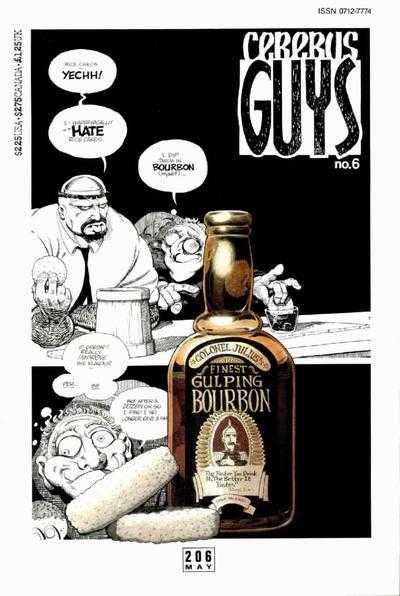 As the book begins, it turns out Dave was as good as his word, and we open on Cerebus hanging out in the little tavern by the Castle Wallis, at the Wall of Tsi. It’s not clear how long he’s been there at this point, but it’s certainly long enough that the bartenders (either Harrison Starkey or Richard George—identical Beatles parodies both) have become familiar with Cerebus’ drinking habits, which aren’t so much habits as a lifestyle at this point. Buckets of scotch will do that to an aardvark. With the Cirinist rule that unmarried men must live in an assigned tavern until they are either ready to settle down, or drink themselves to death, the choice is obvious for many. Among the other denizens of the bar are Cerebus’ old merc buddies (and former employees from his time as pope), Bear and Boobah. Boobah has put on some middle-age weight around the midsection, foreshadowing an underlying theme of the book; what happens to us as we age. Mick and Keef are there too, their marriage to the Buttock sisters clearly having not worked out. Perhaps the most popular (to readers, not to the characters) fellow at the tavern is Marty, a representation of Marty Feldman (starting out as a parody of the Martin Humble character from Starchild), who has somehow over the course of his life worked in every conceivable field. He wastes no time in using this dubious experience to dole out advice and expertise, Cliff Claven-like, on his fellow barflies. A version of comic artist Eddie Campbell and his creation Bacchus, are also there, as well as a number of other comic parodies. The book is rife with these allusions, parodies, and homages to the history of comics. There’s even an Al Hirschfeld/Norman Mailer mashup! These zany characters basically spend the first two-thirds of the book getting hammered every day, shooting the shit, arguing, and playing pranks on one another, as indeed you might if you were trapped in a tavern for the rest of your life.
As the book begins, it turns out Dave was as good as his word, and we open on Cerebus hanging out in the little tavern by the Castle Wallis, at the Wall of Tsi. It’s not clear how long he’s been there at this point, but it’s certainly long enough that the bartenders (either Harrison Starkey or Richard George—identical Beatles parodies both) have become familiar with Cerebus’ drinking habits, which aren’t so much habits as a lifestyle at this point. Buckets of scotch will do that to an aardvark. With the Cirinist rule that unmarried men must live in an assigned tavern until they are either ready to settle down, or drink themselves to death, the choice is obvious for many. Among the other denizens of the bar are Cerebus’ old merc buddies (and former employees from his time as pope), Bear and Boobah. Boobah has put on some middle-age weight around the midsection, foreshadowing an underlying theme of the book; what happens to us as we age. Mick and Keef are there too, their marriage to the Buttock sisters clearly having not worked out. Perhaps the most popular (to readers, not to the characters) fellow at the tavern is Marty, a representation of Marty Feldman (starting out as a parody of the Martin Humble character from Starchild), who has somehow over the course of his life worked in every conceivable field. He wastes no time in using this dubious experience to dole out advice and expertise, Cliff Claven-like, on his fellow barflies. A version of comic artist Eddie Campbell and his creation Bacchus, are also there, as well as a number of other comic parodies. The book is rife with these allusions, parodies, and homages to the history of comics. There’s even an Al Hirschfeld/Norman Mailer mashup! These zany characters basically spend the first two-thirds of the book getting hammered every day, shooting the shit, arguing, and playing pranks on one another, as indeed you might if you were trapped in a tavern for the rest of your life.
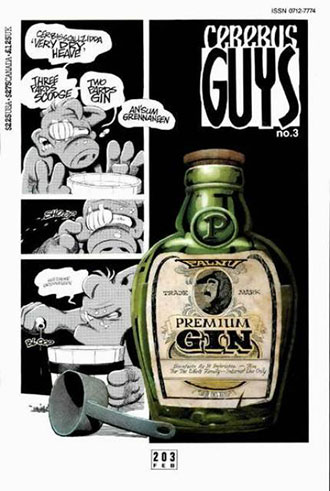 This isn’t going quite as well for Cerebus. We’ve seen him pretty drunk before, but he’s reaching supernatural levels of inebriation in this volume. As a result, he has NOT been as good as his word, and is not perceived as “very warm.” He spends much of the volume going into the red with any goodwill anybody might have shown him. In one notable scene, Bear really lays into him in one of the finest verbal takedowns in comics history. He chews Cerebus out for what he calls “chick shit”—getting emotionally distressed when people don’t react the way he expects them to. But there’s also good times, as there tends to be over the years. And the years do pass. Ger displays it through the changing of the seasons, Dave through the graying hair and expanding waistlines of his characters. In one scene that always sticks out to me because of my initial misunderstanding of it, Bear (grayer around the beard) and Cerebus are sunning themselves in silence on the riverbank when Bear suddenly says “hey, remember…’jobs?'” They both crack up, the joke being that despite the fact that they’re basically serving a prison sentence, it’s a damn sight better than working for a living. My misunderstanding was that, because of Dave’s volume titles (Reads, Minds, Guys, “Jobs”), I erroneously thought that it was some lost Cerebus storyline that I had either missed or that would be revealed in a flashback some time.
This isn’t going quite as well for Cerebus. We’ve seen him pretty drunk before, but he’s reaching supernatural levels of inebriation in this volume. As a result, he has NOT been as good as his word, and is not perceived as “very warm.” He spends much of the volume going into the red with any goodwill anybody might have shown him. In one notable scene, Bear really lays into him in one of the finest verbal takedowns in comics history. He chews Cerebus out for what he calls “chick shit”—getting emotionally distressed when people don’t react the way he expects them to. But there’s also good times, as there tends to be over the years. And the years do pass. Ger displays it through the changing of the seasons, Dave through the graying hair and expanding waistlines of his characters. In one scene that always sticks out to me because of my initial misunderstanding of it, Bear (grayer around the beard) and Cerebus are sunning themselves in silence on the riverbank when Bear suddenly says “hey, remember…’jobs?'” They both crack up, the joke being that despite the fact that they’re basically serving a prison sentence, it’s a damn sight better than working for a living. My misunderstanding was that, because of Dave’s volume titles (Reads, Minds, Guys, “Jobs”), I erroneously thought that it was some lost Cerebus storyline that I had either missed or that would be revealed in a flashback some time.
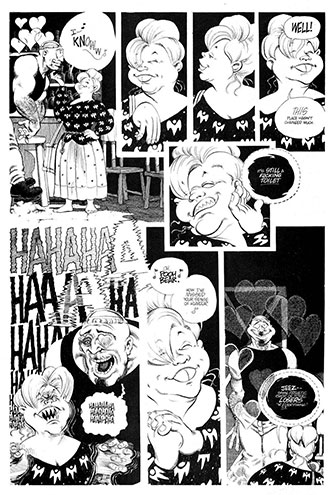 About two thirds through, a woman shows up at the door of the tavern. All the long-timers do a facepalm (“oh shit”) while Bear is cartoonishly hypnotized. This woman, Ziggy (“Zigpig” to the tavern denizens), has had some history with Bear. She is clearly an atrocious woman—demanding, manipulative, and owner of a laugh that could make you jump off a cliff—but Bear is under the spell of what’s under her skirt. The two go upstairs, and the rest of the crew begins making plans to head south, not wanting to stick around for the emotional slaughter to come. Cerebus takes great exception to this, but it’s no use. The next morning, Bear says he’s leaving with Zig, and Cerebus is alone. He’s decided to take over running the tavern and positions himself behind the bar. Thatcher shows up (the bar is under her jurisdiction) and begins to berate Cerebus for not wearing his uniform correctly. He lets loose on her with some heavy telepathy. It seems one benefit of being a hermaphrodite is that you can fight the Cirinists on their terms. He mentally biffs Thatcher so hard that she now bows to his every whim. Time passes. Unexpectedly, he’s visited by none other than Joanne, his mistress from Dave’s scenario in Minds. There’s a vague sensation that they know one another—Cerebus having a clearer memory than Joanne.
About two thirds through, a woman shows up at the door of the tavern. All the long-timers do a facepalm (“oh shit”) while Bear is cartoonishly hypnotized. This woman, Ziggy (“Zigpig” to the tavern denizens), has had some history with Bear. She is clearly an atrocious woman—demanding, manipulative, and owner of a laugh that could make you jump off a cliff—but Bear is under the spell of what’s under her skirt. The two go upstairs, and the rest of the crew begins making plans to head south, not wanting to stick around for the emotional slaughter to come. Cerebus takes great exception to this, but it’s no use. The next morning, Bear says he’s leaving with Zig, and Cerebus is alone. He’s decided to take over running the tavern and positions himself behind the bar. Thatcher shows up (the bar is under her jurisdiction) and begins to berate Cerebus for not wearing his uniform correctly. He lets loose on her with some heavy telepathy. It seems one benefit of being a hermaphrodite is that you can fight the Cirinists on their terms. He mentally biffs Thatcher so hard that she now bows to his every whim. Time passes. Unexpectedly, he’s visited by none other than Joanne, his mistress from Dave’s scenario in Minds. There’s a vague sensation that they know one another—Cerebus having a clearer memory than Joanne. 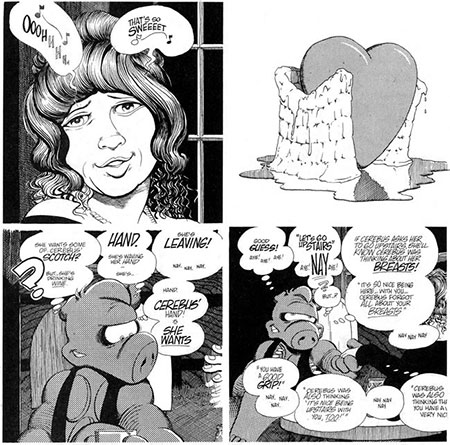 There begins a flirtation, and then a relationship. What follows is one of the funnier and more insightful aspects of the entire 300 issues, what it’s like to be in a relationship, with all the day-to-day roller coastering that usually gets left out of stories, in addition to Cerebus’ hilarious (and expertly lettered) internal arguments. Joanne is guarded, having been hurt in the past, but slowly begins to open her heart to Cerebus, who is basically playing a part, acting, almost, and doing what he’s been advised keeps women around (“be happy and you’ve got her as long as you want her”). What Joanne doesn’t know is that Cerebus has given Bear X number of days to return to the tavern, at which point Cerebus is going to head north to Sand Hills Creek, his birthplace, to see his parents. Joanne finds out about this and storms out. Then (I’m sensing a pattern here), another vaguely familiar face enters the bar. He’s middle aged, robust, and bearded. He teaches Cerebus how to pour a draught that’s not 90% head, then reveals himself as Jaka’s ex-husband, Rick.
There begins a flirtation, and then a relationship. What follows is one of the funnier and more insightful aspects of the entire 300 issues, what it’s like to be in a relationship, with all the day-to-day roller coastering that usually gets left out of stories, in addition to Cerebus’ hilarious (and expertly lettered) internal arguments. Joanne is guarded, having been hurt in the past, but slowly begins to open her heart to Cerebus, who is basically playing a part, acting, almost, and doing what he’s been advised keeps women around (“be happy and you’ve got her as long as you want her”). What Joanne doesn’t know is that Cerebus has given Bear X number of days to return to the tavern, at which point Cerebus is going to head north to Sand Hills Creek, his birthplace, to see his parents. Joanne finds out about this and storms out. Then (I’m sensing a pattern here), another vaguely familiar face enters the bar. He’s middle aged, robust, and bearded. He teaches Cerebus how to pour a draught that’s not 90% head, then reveals himself as Jaka’s ex-husband, Rick.
I know Dave meant the living situation depicted in this book to be negative, but I can’t help but read it thinking, “not too shabby.” Who wouldn’t want to live their days in leisure, with no employment obligations, and unlimited free time to socialize, read, play games, and get hammered? I guess it says something about my nature that I reacted this way—I hate obligation and live for absolute freedom from time. I’ll never get it, of course, which is why this book appeals to me. Life, eh?
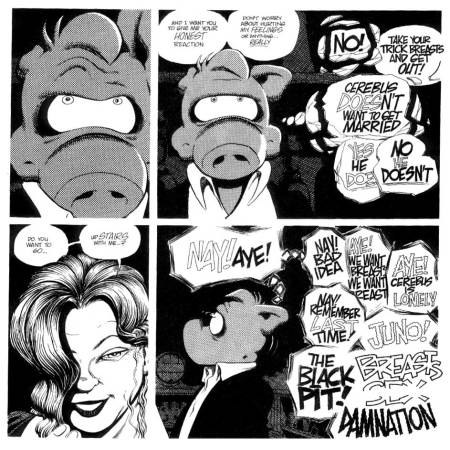 The art in this book is really fun. Dave gets a chance to not only parody characters, but to flex his chops in approximating the styles of Eddie Campbell, Al Hirschfeld, Shannon Wheeler, etc. It adds a strange incongruence to the setting, which sits nicely with Cerebus’ perpetual drunkenness and periodic hallucinations.It also helps pump up the humor with its cartoonish wackiness.The aforementioned internal arguments are also fantastic. The word balloons work as framing devices for panels, but they also look very physical, as if they were real—and to Cerebus, they surely are. There will be more of these in the next volume, and they really crank it up. Ger, on the other hand, was stuck drawing the same building for 19 issues. I imagine he felt as cooped up as the fellas, but his work is immaculate as usual. Another fun bit is that for the first time, the covers also work as part of the story. The dialogue and art leads right into the first page, and usually features some humorous Palnu-distilled liquor bottle.
The art in this book is really fun. Dave gets a chance to not only parody characters, but to flex his chops in approximating the styles of Eddie Campbell, Al Hirschfeld, Shannon Wheeler, etc. It adds a strange incongruence to the setting, which sits nicely with Cerebus’ perpetual drunkenness and periodic hallucinations.It also helps pump up the humor with its cartoonish wackiness.The aforementioned internal arguments are also fantastic. The word balloons work as framing devices for panels, but they also look very physical, as if they were real—and to Cerebus, they surely are. There will be more of these in the next volume, and they really crank it up. Ger, on the other hand, was stuck drawing the same building for 19 issues. I imagine he felt as cooped up as the fellas, but his work is immaculate as usual. Another fun bit is that for the first time, the covers also work as part of the story. The dialogue and art leads right into the first page, and usually features some humorous Palnu-distilled liquor bottle.
Cerebus has changed a fair amount over the years. Where he was once a fairly resourceful, cunning, and self-realized character, he has become petty, childish, and insecure. Is this a subconscious response to Dave’s revelations and his time on Juno? Or is it a result of his all-consuming “love” for Jaka? Coming back to a theme of Reads, that depicts women/relationships as being creative soulsuckers, has Cerebus lost himself in his mad desire for that which he cannot have? Bear, instead, is the voice of reason in this volume, and the truly balanced character (until Ziggy shows up, of course—lending weight to the latter theory above). In his introduction in Church & State, we saw Bear as a loyal, if perhaps dimwitted underling of Cerebus. But it turns out that Cerebus is actually in the lower position when he doesn’t have any gold, perhaps even looking up to Bear as an older brother type. We see a bit of this in a flashback at the end of Melmoth, and throughout this book. Cerebus is in a state of arrested development, and is often in awe of Bear’s experience and wisdom. Hell, it’s because of Bear that he even sticks around in the bar, hoping that his buddy will return. Of course he doesn’t, and we get Rick’s Story instead.
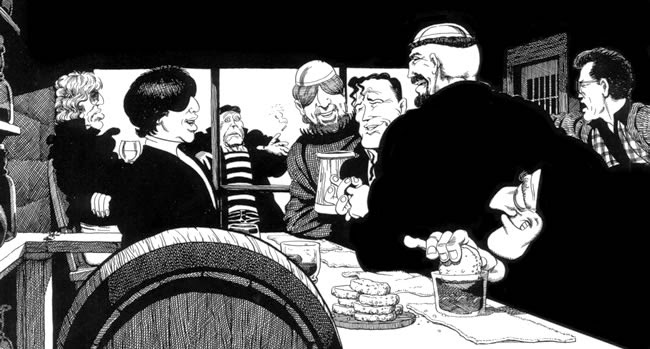

Recent Comments